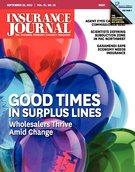Editor’s note: This is part of a series on insurance professionals in politics. This is a national series. Some of the articles focused on the Western U.S. region can be read in the pages of this issue of Insurance Journal. The rest of the series can be found on InsuranceJournal.com.
When it comes to mixing insurance and politics Congressman John Garamendi, D-California, can be considered an authority on the topic.
While Garamendi never served professionally in the insurance industry, after the rancher-turned-politician became California’s first elected insurance commissioner in the early 1990s he has successfully melded the topics of insurance and politics into a career in public service ever since.
Garamendi was elected insurance commissioner in 1991 as a result of Proposition 103 in 1988. He served in office until 1995, then over the next eight years he went into the private sector and was eventually named by President Bill Clinton as deputy secretary of the interior. He was elected for another four years to insurance commissioner in 2003. He served a stint at lieutenant governor before winning election to Congress in 2009.
During his career he has also been in the California Assembly and the state Senate, and he has weighed in often politically on a great number of insurance matters.
Garamendi, who currently lives in Walnut Grove, talked with Insurance Journal about the importance of insurance in politics.
Insurance Journal: Can you talk about insurance and politics? Does the industry play an important role in the political process?
Garamendi: The industry first plays a critical role in the economy and the society. Bottom line: you cannot have an economy without insurance, and a family really cannot prosper without insurance. So insurance is absolutely crucial, and therefore it plays a critical role in the political life of America. My career has been around or involved with insurance in one way or another. I’ve seen the importance of involvement from the insurance community increase in all the years I’ve been involved in it. For example healthcare, which is all about insurance, the Affordable Care Act is in fact a large expansion of the insurance market. It’s the expansion of private industry.
Insurance Journal: Did your involvement with the industry shape the way you see things, or do things?
Garamendi: I was the insurance regulator of the largest insurance market in the U.S. I was the insurance regulator of California, and you’re asking me that? Oh yes. Oh yes it certainly did.
Insurance Journal: Do you feel the industry needs more regulation, or less?
Garamendi: I have always been a supporter of state regulation, as well as protecting consumers. Now, the Affordable Healthcare Act mixes federal regulation with state regulation on the health insurance side. The result of that mixing has yet to be determined. We simply don’t know if it is going to work well or not. The elimination of the Glass-Steagall Act in 1999 created an opportunity for the insurance industry, the baking industry and the investment banking industry to merge. That led up to the financial crash of 2008. Now the Dodd-Frank legislation tries to develop a regulatory program that addresses the problems created by elimination of the Glass-Steagall separation. That, in part, brings a federal regulatory program into the traditional insurance sector, which is creating some confusion on the financial regulation of the industry.
Insurance Journal: What are the top insurance issues out there that need to be addressed?
Garamendi: Most important, at the federal level, is a regulatory program that would separate the insurance operations of multifaceted financial institutions from the investment banking and banking operations to provide the financial security necessary for the insurance companies to be able to pay all of the claims. It’s not clear how that would be done. It all goes back to the repeal of Glass-Steagall and the merging of the three sectors creating a very difficult regulatory situation and frankly a very difficult financial situation where AIG goes down and it takes a lot of financial institutions with it, partly because they were involved in an insurance scheme that was not regulated thanks to the Glass-Steagall elimination. That particular product was never defined as insurance.
Insurance Journal: Can you talk about the farm bill?
Garamendi: The farm bill is another incident of federal regulation of a very significant insurance market, and that could expand as result of the farm bill. Should there actually be a farm bill.
Insurance Journal: Will it pass?
Garamendi: Yes, in some form. That’s to be determined.
See related stories: Agent Ted Gaines Eyes California Commissioner Seat (Page 2), Beth Gaines Wants More ‘Business-Friendly’ State (Page 2) and Cooley Masters Quake Insurance (Page 8).
Topics California Legislation Market
Was this article valuable?
Here are more articles you may enjoy.



 Experian Launches Insurance Marketplace App on ChatGPT
Experian Launches Insurance Marketplace App on ChatGPT  Preparing for an AI Native Future
Preparing for an AI Native Future  Lemonade Books Q4 Net Loss of $21.7M as Customer Count Grows
Lemonade Books Q4 Net Loss of $21.7M as Customer Count Grows  Munich Re Unit to Cut 1,000 Positions as AI Takes Over Jobs
Munich Re Unit to Cut 1,000 Positions as AI Takes Over Jobs 


